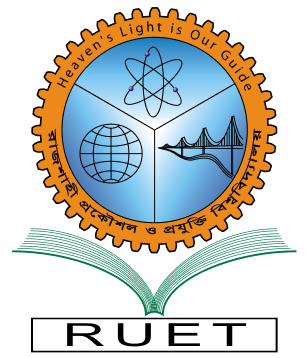Vision
Rajshahi University of Engineering & Technology (RUET) envisions becoming a center of excellence in engineering education, research, and innovation that drives national transformation and contributes to achieving the United Nations Sustainable Development Goals (SDGs). Through a commitment to technological advancement, ethical leadership, and inclusive development, RUET aspires to create a sustainable, equitable, and knowledge-based society for future generations.
Mission
RUET’s mission is rooted in the belief that engineering, science, and technology are powerful instruments for achieving sustainable progress. To fulfill this vision, the university is committed to:
Transformative Education
Cultivate technically skilled, socially responsible, and environmentally conscious graduates who can apply their knowledge to real-world challenges and promote sustainability in every aspect of their professional life.
Innovative Research and Development
Foster interdisciplinary and collaborative research that addresses pressing global issues such as renewable energy, climate resilience, sustainable infrastructure, clean water and sanitation, and digital transformation.
Industry and Community Collaboration
Build strong partnerships with industries, governmental agencies, and NGOs to translate academic research into practical solutions that enhance community well-being and environmental sustainability.
Inclusive and Ethical Leadership
Promote diversity, integrity, and transparency across all academic and administrative activities, ensuring that technological advancement aligns with social justice and ethical values.
Environmental Stewardship
Integrate sustainability principles into campus operations—promoting energy efficiency, waste reduction, green infrastructure, and awareness among students and staff.
Engagement for Sustainable Development
RUET’s engagement in the pursuit of the SDGs extends beyond academic boundaries, involving policy contribution, research collaboration, student participation, and community outreach.
1. Policy-Level and Institutional Engagement
RUET actively participates in national and regional discussions on sustainable technology and development policy. Through expert committees, policy advisory groups, and collaborations with government and development organizations, the university contributes to evidence-based policymaking aligned with the SDGs—especially in areas of clean energy, digital governance, and climate resilience.
2. Research and Innovation for SDGs
RUET’s research culture emphasizes practical, high-impact innovation. Faculty and students engage in multidisciplinary projects focusing on:
Renewable energy systems (SDG 7)
Smart city development (SDG 11)
Sustainable industrial processes (SDG 9)
AI and IoT for societal good (SDG 4, 8, 13)
Water resource management and environmental protection (SDG 6, 15)
Collaborative research with national and international institutions ensures that RUET’s contributions address both local challenges and global sustainability priorities.
3. Student and Community Engagement
Student-led initiatives—such as energy awareness campaigns, clean campus drives, blood donation programs, rural electrification projects, and digital literacy training—reflect RUET’s strong culture of volunteerism and civic responsibility. The university encourages students to act as ambassadors of sustainability, integrating SDG awareness into clubs, workshops, and innovation challenges.
4. Industry-Academia Partnerships
Through the RUET Innovation & Entrepreneurship Center (IEC) and departmental linkages, the university collaborates with industry to co-create sustainable technologies, promote green manufacturing, and align technical education with the evolving needs of the job market. These partnerships not only enhance employability but also contribute to sustainable industrial innovation (SDG 9).
5. Alumni and Global Collaboration
RUET’s alumni network plays an active role in fostering mentorship, research collaboration, and philanthropy for sustainable development. Many alumni contribute to global SDG efforts in academia, government, and industry—creating a bridge between the university and international sustainability initiatives.
6. Cultural and Environmental Stewardship
RUET celebrates Bangladesh’s cultural and natural heritage by promoting awareness of environmental conservation, cultural diversity, and social harmony. Through events such as “Green Campus Week,” “Clean Energy Seminars,” and “Sustainability Awareness Fairs,” RUET integrates cultural identity with sustainable progress.
Conclusion
Through education, research, and community partnership, RUET stands as a driving force in advancing the Sustainable Development Goals, embodying the spirit of innovation and responsibility that defines Bangladesh’s engineering future. By empowering its students and scholars to think critically, act ethically, and innovate sustainably, RUET continues to build a resilient and inclusive path toward a better tomorrow.
